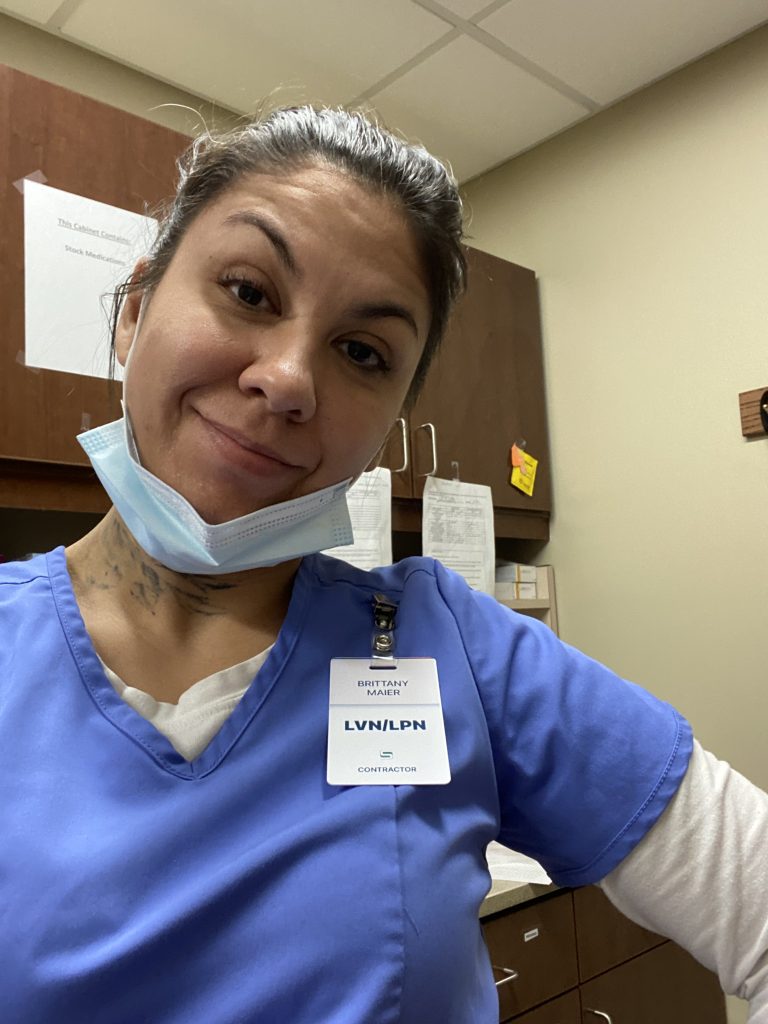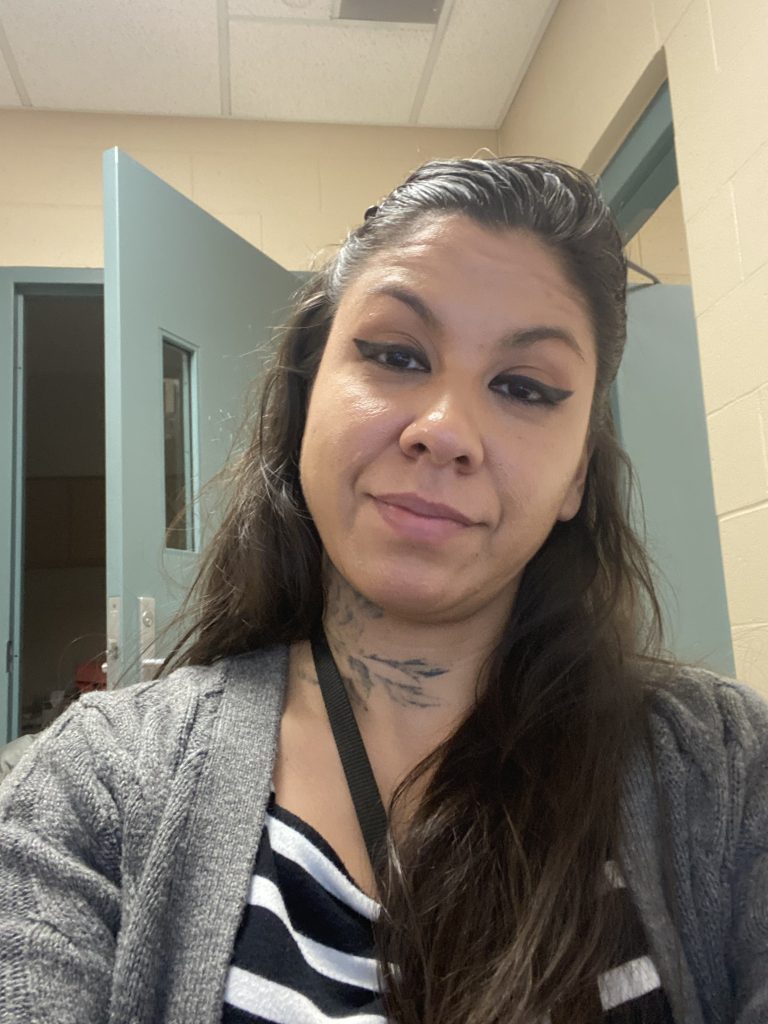It’s true, correctional nursing suffers from something of an unfair stigma. But we talked with a corrections nurse who made a passionate case for the importance of the work — and has some reassuring words to spare!
We got to know Brittany through our nurse photo contests, and soon realized she had valuable experience to share with those considering a job as a correctional RN or LPN. She works in both a jail and a behavioral health clinic, and was incredibly kind in accepting a Q & A with us about her dual position.
Her perspective is not just substantive but also deeply personal. Coming from her background, she explained, “it’s amazing I graduated high school at all: the first generation in my family to do so”. For a few years in her youth, things did not go well. Struggling with mental health, she eventually found herself in a booking cell for a charge that was later dismissed. “But I knew that I did not want that life,” she says — and nursing school provided the way out.
“I wanted to do something meaningful,” she tells us, “to help others”. A twist of fate brought her in contact with the Director of her County’s Community Service Division. Now she can tell you from experience about what working as a ‘jail nurse’ is like.
“It’s not for everyone,” she admits. “You definitely need a thick skin. You really can’t take things personally.” But honestly, she adds, it’s “not as scary as one might think. The vast majority of the inmates aren’t dangerous people”.
The most important thing about working in corrections, Brittany stresses, is that “you cannot be biased”. You work with people who committed crimes, yes. “Some of which are pretty awful”. But you can never “let the correctional side of things interfere with your care as a nurse… You can’t look at what they did. You are looking at them as a patient, not a criminal”.
In the end, your patients will just be people — people who have “been through trauma, hardships, addiction, some sort of struggle,” not unlike in some other nursing specialties. Who “are just trying to get through each day … at the lowest point in their lives”.
As a correctional nurse, Brittany hopes to do her bit to address the mental health crises that our penitentiary systems face today. Above all, she says, she hopes to herself “serve as an example that if you want to better your life, you can. It’s not easy, and there will be many challenges ahead, but it is achievable. I hope to help others find the way.”
NurseRecruiter.com currently lists over 200 jobs in correctional nursing. If you’re hesitating about hitting that “I’m Interested” button, read the full Q & A below. And if you would like to tell us about your own nursing specialty, use our photo contest form to get in touch!
“I hope to help others find the way”: this correctional nurse has a personal story to tell — and plenty of advice to spare!
How did you come to take up this job? Did you actively look for a correctional position, or was it more of a coincidence?
It happened when I was working out in a gym! I was approached by another member, and when they learned I was in nursing school they became interested and asked if I had ever thought about Correctional Nursing. I lit up, and said definitely!
I have a strong belief that rehabilitation is possible in most situations, if the person in question genuinely desires it. I actually attended college for Criminal Justice, but couldn’t finish it when the college was shut down. I did already have a degree in Business Administration, but I knew I wanted to do something meaningful, to help others. That’s how I came to take up nursing. And I guess being in the gym that early morning put me in the right place at the right time to meet the Director of our County’s Community Service Division!
When they started talking to me it turned out they were actively looking for a jail nurse and liked what I had to offer. So they decided to mentor me into a position with them.
How does the reality of correctional nursing compare to your initial expectations? Has it been easier or harder than you thought, or just different?
The reality is about the same. I knew it was going to be a challenging position, and there’s certainly room for growth in the field. I wouldn’t say it has been easier or harder, but I can say it’s not for everyone.
Have you had to make any adjustments in how you approach your patients? Do you have to make your own judgment calls more often, or stick to the letter of regulations more strictly?
Personally, I haven’t had to make many adjustments. Minor ones when dealing with patients, in how I communicate with the inmates. There is a significant difference in education levels. It’s also challenging when you come across someone you know. But mostly it’s just about taking extra precautions in terms of safety (not turning my back on an inmate), and remembering that they are in jail and certain privileges are taken away.
There are definitely more rules and regulations. Things go pretty well by the book: we follow WI State Statues for guidance while staying within our scope of practice.
We deal with a lot of behavioral health, mental health situations, but there is a whole array of other medical situations that can arise too. My position is unique in that I’m in a dual role; I also work for the Behavioral Health Clinic for this county. There is a lot of crossover of inmates and patients and it’s actually quite helpful to be able to do both.
Behavioral health is certainly challenging, especially when you yourself struggle with mental health. It has been a blessing to be able to work for an organization that really cares about helping people and their overall well being. And if I were to compare the two settings I would say they are similar: they both consist of people. A lot of whom have been through trauma, hardships, addiction, some sort of struggle. The majority didn’t ask to be put in those circumstances. They are just trying to get through each day, because yes, it can be that difficult, for many different reasons. That’s how they are the same.
They differ in the amount of freedom they have. The rules that are applied. There’s more freedom, although not always as there are court ordered situations we deal with. The jail is much more secure however. I had to do quite the clearance process to be hired for the position.
Yeah, let’s just call out the elephant in the room. I imagine some nurses hesitate taking up a job as a correctional nurse because they’re afraid it’s dangerous… What would you tell them?
I would say that jails and prisons are actually one of the safest places to work because of the high presence of guards and officers! And the vast majority of the inmates aren’t dangerous people. They are actually broken people, many of whom committed a crime while under the influence. That doesn’t mean it’s okay, of course, which is why they are incarcerated. But it’s important to remember that no child starts out by saying, “When I grow up, I want to be a criminal, I want to be in jail”. Something happened to that child along the way where they got lost down the wrong path.
Just going on your impressions so far, what skills or personality traits make a nurse especially well-suited for correctional work? Conversely, are there certain types of nurses who might be really good in other settings, but maybe not great for correctional nursing?
I can say that it’s not for everyone. You definitely need to have a thick skin. You will get comments, you will have to deal with manipulation. It’s about getting around that stuff and not letting it bother you. You really can’t take things personally.
You also really cannot be biased when you work in this position. You have people who committed crimes, some of which are pretty awful, but you can’t look at what they did. You are looking at them as a patient, not a criminal.
It is definitely not for the timid, but honestly not as scary as one might think. A lot of inmates actually go to the ER, to clinics and dental clinics, so if you practice nursing in any of those areas you might already know what it’s like to interact with inmates.
You mentioned something about your own personal backstory and the challenges you overcame to become a nurse. Would you like to share something about that, and about whether it played any role in the jobs you decided to pursue?
Working as a nurse in a jail or behavioral health clinic is not something I would have ever imagined doing. I was born into a disadvantaged life with tremendous obstacles, ultimately getting through school on my own. It’s amazing that I graduated high school at all: the first generation in my family to do so.
Life didn’t come without its challenges however, and I ended up in factory work for years, with my own life battles, struggling with my mental health and overall well being. I ended up in a booking cell for a drinking and driving charge which was later dismissed. But I knew that I did not want that life, to go down that path.
It wasn’t easy, but I eventually gave up drinking. I knew I needed to do something meaningful with my life, and I saw an opportunity to go back to school. Nursing was the way to go!
Now, after 13 years of sobriety, I work for the same jail where I once sat in a booking cell. It’s not something I knew I wanted to do until I started doing it. I’m very passionate about mental health, and let’s face it, jail and mental health in America is a broken system. I stand to serve as an example that if you want to better your life, you can. It’s not easy, and there will be many challenges ahead, but it is achievable. I hope to help others find the way.
What advice would you give to a nurse taking on a correctional job for the first time?
If I were to give advice, it would be to find balance. You cannot go into this position being afraid of the inmates. Most are harmless, but they will feed off of your fear if you let them. In reality they are just broken people, some of which are at the lowest point in their lives. Just stand your ground and be firm, but don’t let the correctional side of things interfere with your care as a nurse — and always follow the state or federal guidelines and statutes.
As nurses, we help provide care and guidance for those who need it most. And I really hope that somehow, someday, we can help improve the mental health crises that our jail and prison systems face today.
Brittany M, LPN



Carol R Coleman
I want to return to jail nursing only closer to home. I desire to work at Rice St Jail